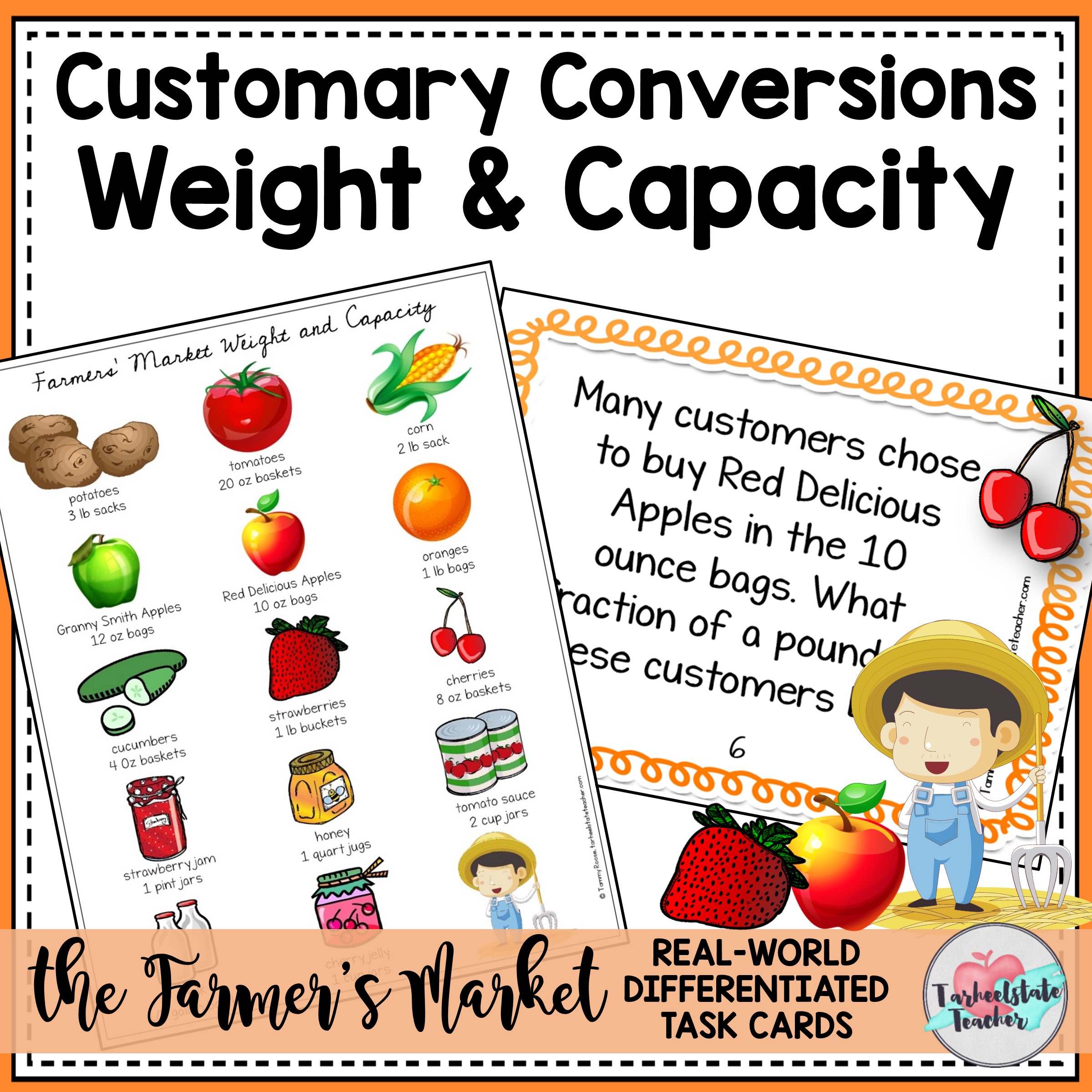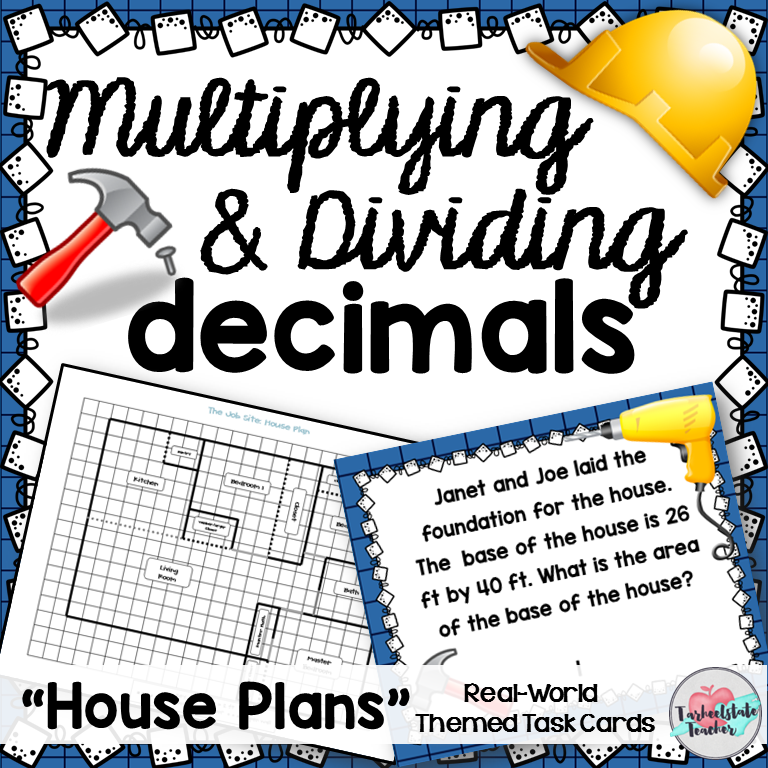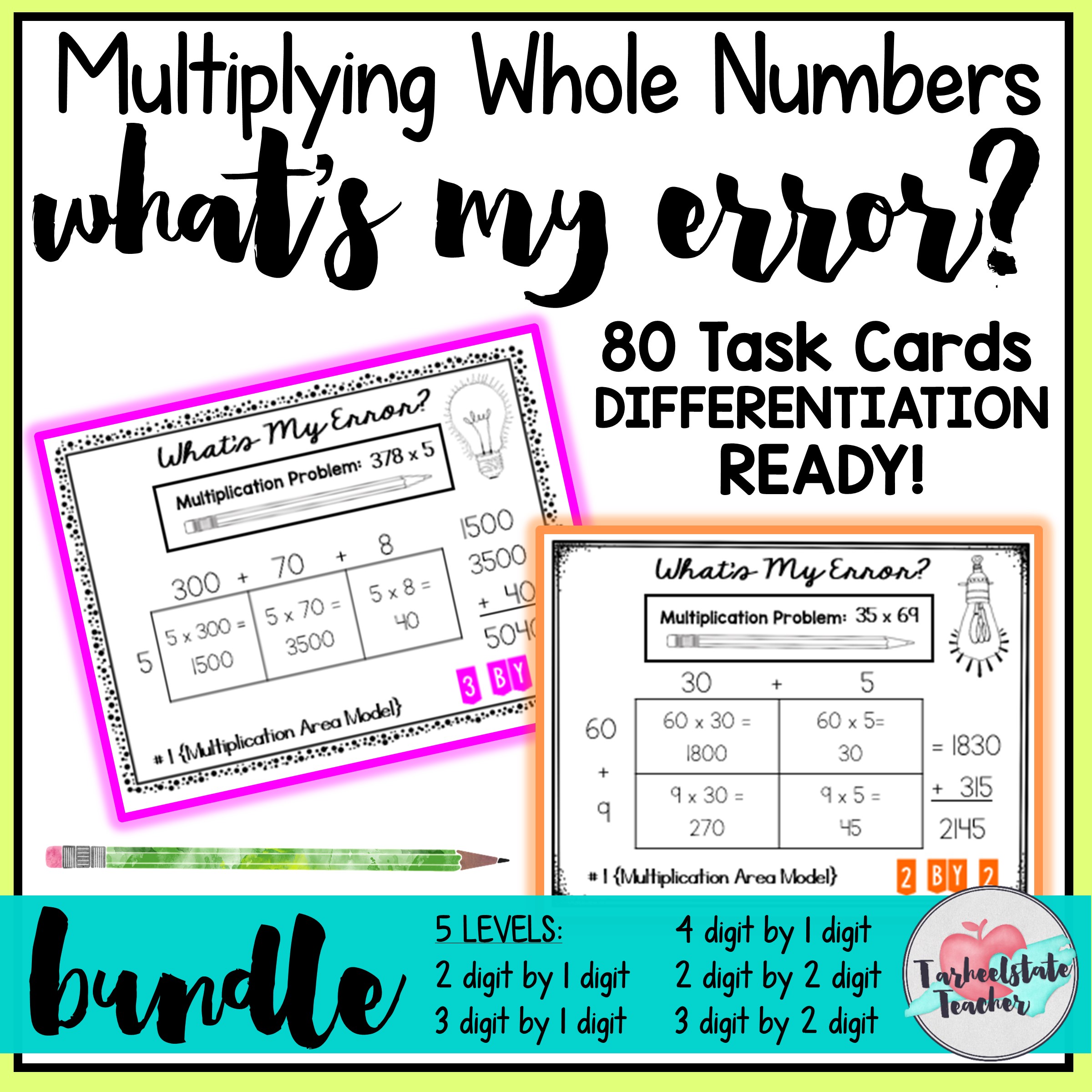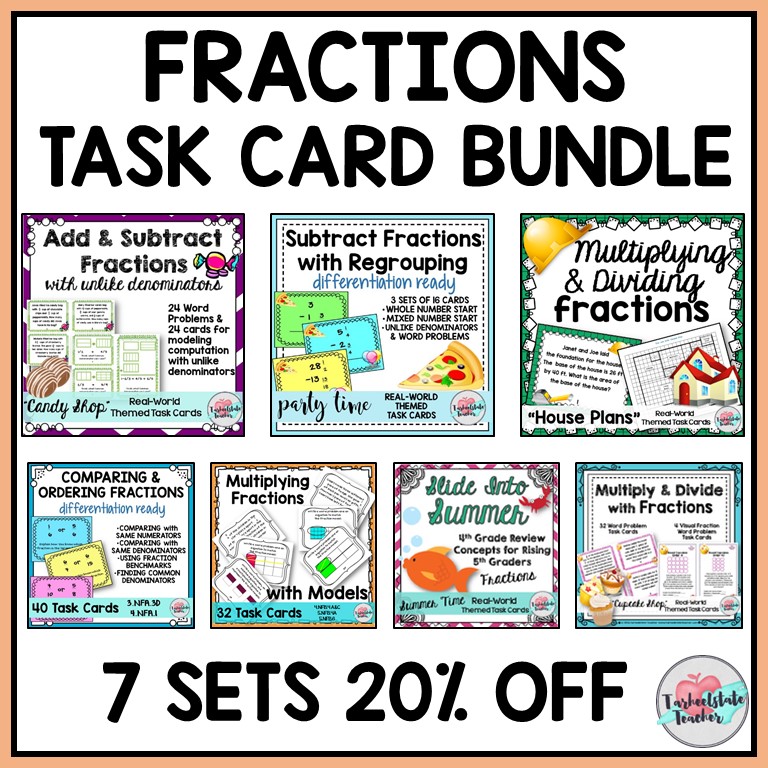Task Cards are just Glorified Worksheets!
Are you using task cards in your classroom, yet?
Today, I want to share my experiences with using task cards for math instruction and all the reasons why I believe they are BETTER THAN WORKSHEETS. I think it was around 5 years ago that I really embraced task cards and it's never too late for you to start harnessing the magic that I think they are!
That year, we had a math textbook that I thought was decent, but that relied heavily upon activity workbooks and whole group instruction (#notmystyle). As I was planning one day, staring at a workbook page of word problems that I thought would be beneficial for my students but hating the idea of them just sitting and doing desk work for another day, I decided to type up the word problems and cut them out so that students could move around the room working on questions {instant task cards!}. Later, I began making my own math task cards with word problems focused around the concepts I was teaching and using "real-world" themes that I thought would be fun for my students.
I know many teachers use task cards as a math station or center activity, but I always launch a set of task cards by using them in whole group first and then move students into differentiated stations as needed.
I think a lot of the magic comes from using task cards as a whole-group teaching method, so as I share some reasons why I think task cards are absolutely MAGICAL in math class and more than a worksheet, keep the image of all students working on a set of task cards at the same time in your mind.
1) Students think we are doing something fun because they get to move around the classroom. Sometimes, you'd think we were having a party in math class! (For End of Year math review, we actually DO throw a low-key summer-themed party with our Slide into Summer task cards!)
2) Students are more willing to ask questions and seek out help. I find that when students are up and moving around the room, I've created a safe place for students to feel more comfortable asking me for help. Task cards can also provide so much variety in the way questions are presented that any student may encounter a problem that they have a question about.
3) Task Cards encourage a growth mindset (if growth mindset is already a part of your classroom environment). I often use task cards for two days in a row. Students are able to see their growth from their initial exposure to the task cards to the following day. I am certain to compliment, "Doesn't today seem a little easier? You guys are getting the hang of it!"
4) ANSWER KEYS allow for EASY CHECKING! I print at least two answer keys for my task card sets because sometimes I have an AIG or inclusion teacher in the room with me. When it makes sense, I've also allowed students to use the answer key to check themselves. I walk around the room, sit at a desk in the middle of the room, or stand at a shelf where I can check papers while students are working. Students know to come check in with me regularly and I ask some students to check in with me more often, or have them sit beside of me so that I can give them instant feedback on each problem. If I have lag time, I call students over who have not checked in with me yet. With my answer key in hand, I can give students super fast feedback. When math class is over, I can also check over students work in a matter of minutes and see who needs more assistance and who is ready to move on. Workbooks, worksheets, and packets don't seem to have this same quick grading speed and I RARELY TAKE TASK CARD ANSWER SHEETS HOME TO GRADE because it's so easy to get them checked before I head out.
5) Task cards allow for easy differentiation. Many task card sets are organized by levels of difficulty and get increasingly more challenging. Task cards that are not organized this way can be sorted by the teacher and you can send groups of students to the cards that you want them to work on first. I've also purchased task cards on specific skills (like rounding or multiplication, for example) in varying levels so that I could use different cards with different students. (I've organized my Subtracting Fractions with Unlike Denominators and Regrouping and my Comparing and Ordering Fractions Task Cards into increasing levels of difficulty so that I could easily move my students from one version of the concept to the next layer of the concept).
6) Task card answer sheets make it easy to create small groups. This piggybacks on #5, but when I use a set of task cards for two days, I am easily able to use students' performance on the first day to create small groups or partnerships that will better support students' learning on the following day. I jot down groups of students that I want to focus my attention on and sometimes even sort the answer sheets based on performance to either modify the students' assignment or make plans to provide them more direct instruction.
7) Task cards are a LOW PREP, high engagement, worthwhile instructional method. I can have a set of task cards, answer keys, and student answer sheets ready to go in a matter of minutes during planning. (Yes, this is easier when you have been using task cards for a while and know the ones you used in previous years that you want to use again, but task cards are also easy to find on teacherspayteachers, and I hope you look around my store to see what's available for your 3rd, 4th, and 5th graders.) After the first day of introducing task cards, I may have to seek out a set of easier or more challenging cards to help me differentiate, but often, I've already got the next level of cards prepared for my students who are ready.
8) After I've used a set of task cards with the whole class, it's easy to move them into a station rotation for review, extra practice, as an intervention, or to differentiate for students who still need to work on the concept.

9) Students seem more willing to persevere when I'm using task cards. Ever have a student shut down when working on a worksheet? Well, this seems to be a little more difficult to do when working on task cards. Students have to get up and move, they have others around them who are working busily, and they have teachers and friends who are willing to help when they are stuck. When a student gets frustrated with a card or I realize that they are just not ready for it, I guide them to another card that can help them feel more successful.
10) Self-motivated students have the opportunity to push themselves. Some students are less likely to push themselves to see what more they can do when the instructional mode is to listen to a whole group lesson, complete a textbook page, wait for others to finish, listen to more whole group instruction, complete a textbook page, yawn, wait a little longer.
There's very little waiting with task cards. Students can just keep moving along at their own pace, which is especially FREEING for those students' whose pace is usually faster than most of their classmates.
11) I am able to create student "math leaders." Often within a set of task cards, 1-2 problems are really tricky, even for my gifted students. After I work through a problem with one student, I can ask that student to be the expert on that question and assist other students as they have questions about it.
12) Most magically, students LOVE task cards. They beg me for them. When it is time to head to lunch or go to recess, my students often yell, "No! I don't want math to be over!" It's so rewarding! I offer to skip recess and keep doing math, but they never take me up on the offer. At least they will be happy when we pull the cards out again on the following day!
If you have tried using task cards in your classroom and just didn't get the results or engagement that you expected, I'm sharing a few reasons why your students may not respond well to task cards in my next post.
Need some task cards? I'm here to help because I am madly in love with task cards as a differentiation and teaching strategy! I really can't say it enough about how much I love task cards--if you haven't tried task cards in your math classroom, I highly recommend them! If you already love them for a reason I left off of this list, let us know why in the comments!
Rounding Tens, Hundreds, Thousands (Around the USA themed)
Place Value: Comparing Values in Numbers (Around the USA themed)
Multiplying with the Area/Array Model (Error Analysis)
Dividing Whole Numbers with the Area Model (1 digit and 2 digit divisors)
Multiplication and Division of Whole Numbers Multistep Problems
Adding and Subtracting Fractions Candy Shop Theme (unlike denominators)
Subtracting Fractions with Regrouping Party Time Theme (like and unlike denominators)
Multiplying Fractions Task Cards (with representational models and word problems)
Multiply and Divide Fractions House Plans Theme (incorporates area)
Customary Measurement at the Farmer's Market (converting gallons, quarts, pints, cups)
Multiplying and Dividing Decimals House Plans Theme (incorporates area)
4th Grade Review for End of Year or Beginning of Year 5th (summer slide theme)
Challenging Multistep Word Problems for 5th Graders (Regions of USA themed)





